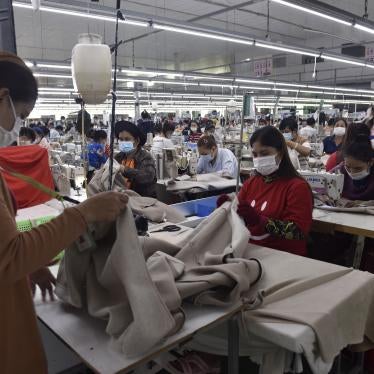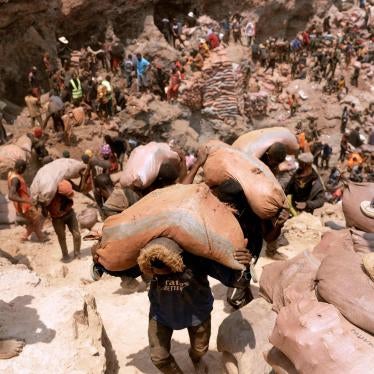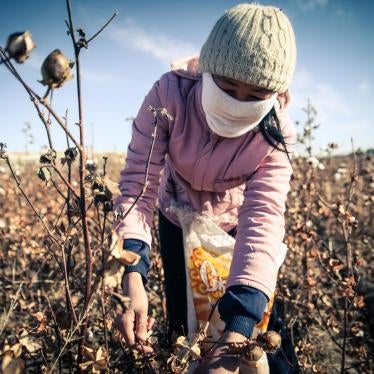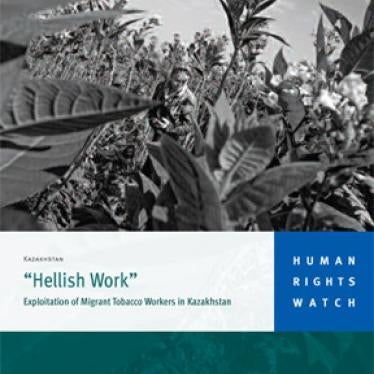June 5, 2015
His Excellency Mr. Ban Ki-moon
United Nations Secretary-General
United Nations Headquarters
New York, NY 10017
Dear Mr. Secretary-General:
In advance of your upcoming trip to Uzbekistan, we write to request that you use your visit to express concern to officials in Tashkent about the government’s use of mass forced labor and to urge them to end the practice.
The Uzbek government has operated one of the largest state-orchestrated systems of forced labor in the world for decades. The UN Human Rights Council,[i] Committee on the Rights of the Child[ii] and Committee Against Torture[iii] have all reported concerns of forced labor and child labor and urged the Uzbek government to end the practice. In its 2015 report, the International Labour Organization reminded the government of Uzbekistan of workers’ inalienable right to free choice of employment without the menace of any penalty and urged the government to cooperate with the ILO and to eliminate forced labor.[iv]
Human rights monitors in Uzbekistan report the Uzbek government forced farmers to meet state quotas for cotton production and forced more than a million of its own citizens to pick cotton in 2014.[v] Following international pressure, the government has begun to substantially reduce forced child labor, and in 2014 it did not mobilize children nationwide. However, it increased the use of forced adult labor to compensate, which degraded education and health services and led to widespread extortion of individuals and businesses. During the spring of 2015, officials have once again forced children and teachers, nurses and other public sector workers to weed and work in the cotton fields.[vi]
As an essential element of its coercive system of cotton production, the government of Uzbekistan represses the rights of citizens reporting human rights concerns. In its latest report on Uzbekistan, the UN Human Rights Committee reported it remained “concerned about the number of representatives of independent non governmental organizations (NGO), journalists, and human rights defenders imprisoned, assaulted, harassed or intimidated, because of the exercise of their profession.”[vii] For example, Muhammad Bekjanov and Azam Farmonov documented the government’s forced labor system and other human rights abuses, and they have now spent 16 and 9 years in prison, respectively, on trumped up charges.[viii] Last month, the government extended Mr. Farmonov’s prison term for an additional 5 years, and Mr. Farmonov appealed directly for your support as UN Secretary General.[ix] On May 31, police in Uzbekistan arrested and brutalized human rights monitor Elena Urlaeva, as she was documenting systematic, government-organized forced labor in the country’s cotton fields.[x] In the last 13 years, the Uzbek government has denied 13 requests by UN special procedures for access to the country. The UN Special Rapporteur on Contemporary Forms of Slavery has requested access each year since 2008 and has not received a response.
The Uzbek government’s forced labor system also creates risk of legal liability and breaches of the UN Principles on Business and Human Rights for multinational companies investing in the country. Daewoo International, the largest processor of cotton in Uzbekistan, has acknowledged purchasing forced-labor cotton.[xi] TeliaSonera reported it contributed to the harvest because all multinational corporations are required to contribute to the cotton harvest as a prerequisite to doing business in the country.[xii]
Your visit to Uzbekistan is an important opportunity to convey UN concern at the highest level about the state-sponsored forced labor and the need to end this practice. We urge you to raise concern both publicly and privately and to specifically ask the government of Uzbekistan to take the following key steps:
- Apply ILO Convention No. 105 on the Abolition of Forced Labor, including by ceasing state coercion and prosecuting anyone who forces others to work, implementing an action plan in collaboration with the ILO, and permitting unfettered access for the ILO to monitor core labor standards in the agriculture sector with the participation of the International Trade Union Confederation and International Organisation of Employers;
- Allow independent human rights organizations, activists and journalists to investigate and report conditions in the cotton sector without facing retaliation, and release, immediately and unconditionally, Muhammad Bekjanov and Azam Farmonov and all others held on politically motivated charges;
- Ensure farmers can recruit labor by setting the price for raw cotton above production costs and setting minimum wages for field work sufficiently high to attract voluntary labor;
- Reform the cotton sector, including reporting state expenditures and income from the cotton sector to the Uzbek Supreme Assembly, ending the reallocation of land as a penalty against farmers who do not fulfill cotton quotas, replacing quotas with incentives, and de-monopolizing agricultural suppliers and processors;
- Ratify and apply ILO Convention No. 87 on Freedom of Association and Protection of the Right to Organize; and
- Issue invitations to all UN special procedures who have requested access, including the UN Special Rapporteur on Contemporary Forms of Slavery, and cooperate fully in all aspects of their fulfilment of their mandate, as well as that of other UN monitoring bodies, including by implementing fully the recommendations they have issued.
We believe your leadership can be a key motivator for the government of Uzbekistan to end its practice of forced labor and to fulfill its international human rights commitments.
Sincerely,
Cotton Campaign
Advocates for Public Interest Law
American Apparel & Footwear Association
AFL-CIO
American Federation of Teachers
Anti-Slavery International
Aquinas Associates
Association for Human Rights in Central Asia
Calvert Investments
Center for Reflection, Eucation and Action
Daughters of Charity, Province of St Louise
Dignity Health
Eileen Fisher
Environmental Justice Foundation
The Eurasian Transition Group, e.V.
Gonggam Human Rights Law Foundation
Human Rights Watch
Inditex
Inkota-netzwerk e.V.
International Labor Rights Forum
Korean Teachers and Education Workers Union
Mercy Health
Mercy Investment Services
Northwest Coalition for Responsible Investment
National Retail Federation
Open Society Foundations
Portfolio Advisory Board, Adrian Dominican Sisters
Responsible Sourcing Network
Sisters of St. Francis of Philadelphia
Solidarity Center
St. Joseph Health
Stop the Traffik
The Sunshine Coalition
Trinity Health
Uniting Church in Australia, Synod of Victoria and Tasmania
United States Fashion Industry Association
Uzbek-German Forum for Human Rights
Walden Asset Management
Walk Free
[i] United Nations Human Rights Council, “Report of the Working Group on the Universal Periodic Review: Uzbekistan,” A/HRC/24/7, April 2013, paragraphs 133.40-45.
[ii] Committee on the Rights of the Child, Concluding observations on the combined third and fourth periodic reports of Uzbekistan , adopted by the Committee at its sixty-third session (27 May- 14 June 2013), CRC/C/UZB/CO/3-4, Geneva, 10 July 2013, paragraph 65b and c
[iii] United Nations Committee against Torture, “Concluding observations on the fourth periodic report of Uzbekistan,” November 2013, paragraph 22.
[iv] International Labour Organization (ILO), “Report of the Committee of Experts on the Application of Conventions and Recommendations,” Report ILC.104/III(1A), at pages 173-176.
[v] Uzbek-German Forum for Human Rights, “The Government’s Riches, the People’s Burden: Human Rights Violations in Uzbekistan’s 2014 Cotton Harvest,” April 2015, http://uzbekgermanforum.org/wp-content/uploads/2015/04/cotton_harvest_Online.pdf
[vi] See: http://uzbekgermanforum.org/uzbek-government-continues-forced-labor-system-to-weed-cotton-fields/
[vii] United Nations Human Rights Committee, “Concluding observations of the Human Rights Committee: Uzbekistan,” New York, 8-26 March 2010, CCPR/C/UZB/CO/3, paragraph 24.
[viii] Human Rights Watch, “Until the Very End: Politically Motivated Imprisonment in Uzbekistan,” September 2014, https://www.hrw.org/reports/2014/09/26/until-very-end.
[ix] “Uzbekistan: Imprisoned rights advocate’s letter sheds more light on torture in prisons,” Fergana News, 26 May 2015, http://enews.fergananews.com/news.php?id=2987&mode=snews.
[x] See: http://www.cottoncampaign.org/uzbek-police-brutalize-human-rights-monitor-elena-urlaeva.html
[xi] “Posco Unit Admits Using Cotton From Forced and Child Labor,” The Wall Street Journal, August 13, 2014, http://www.wsj.com/articles/daewoo-faces-criticism-for-use-of-uzbekistan-cotton-made-with-forced-labor-1407918539.








